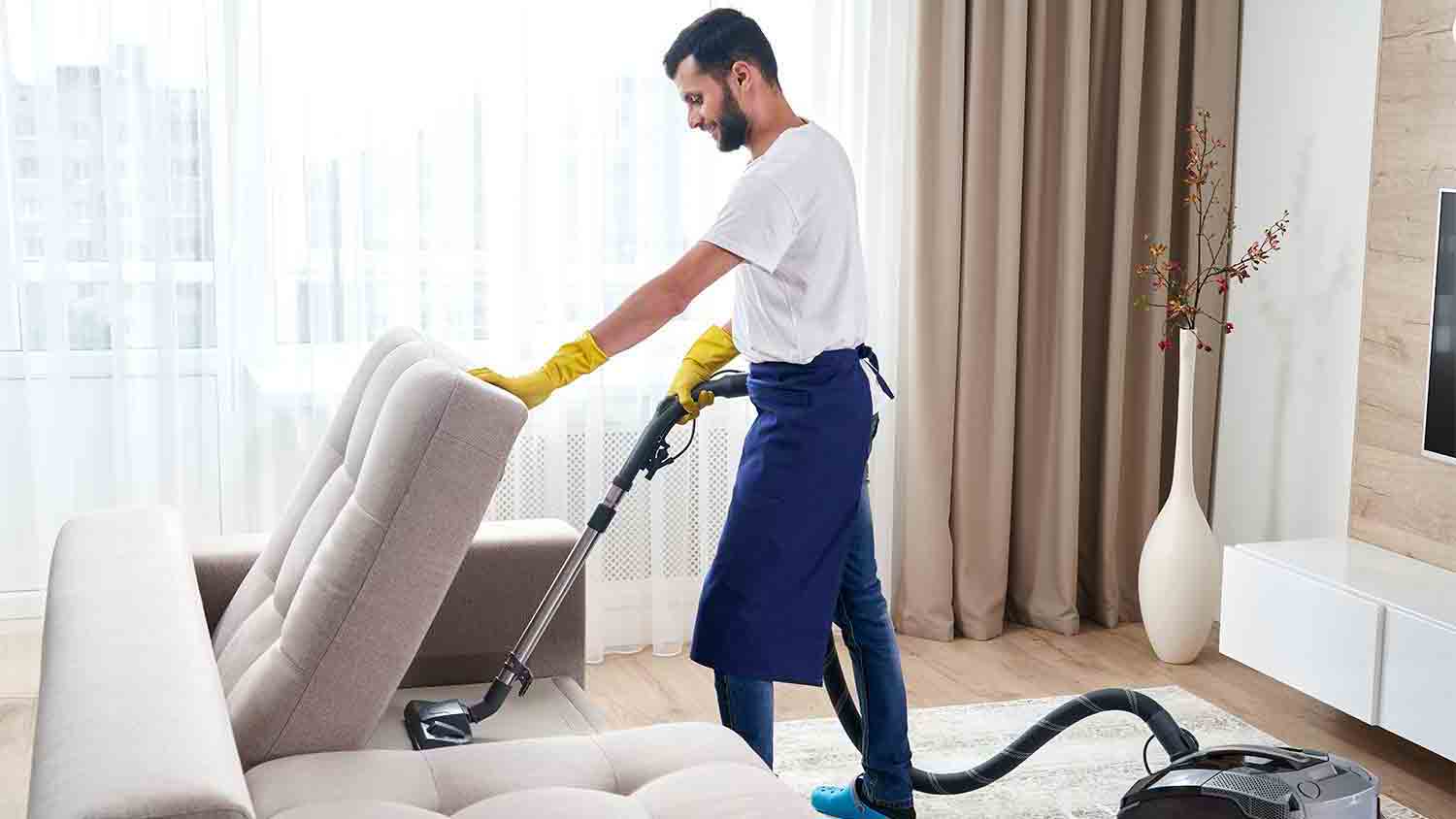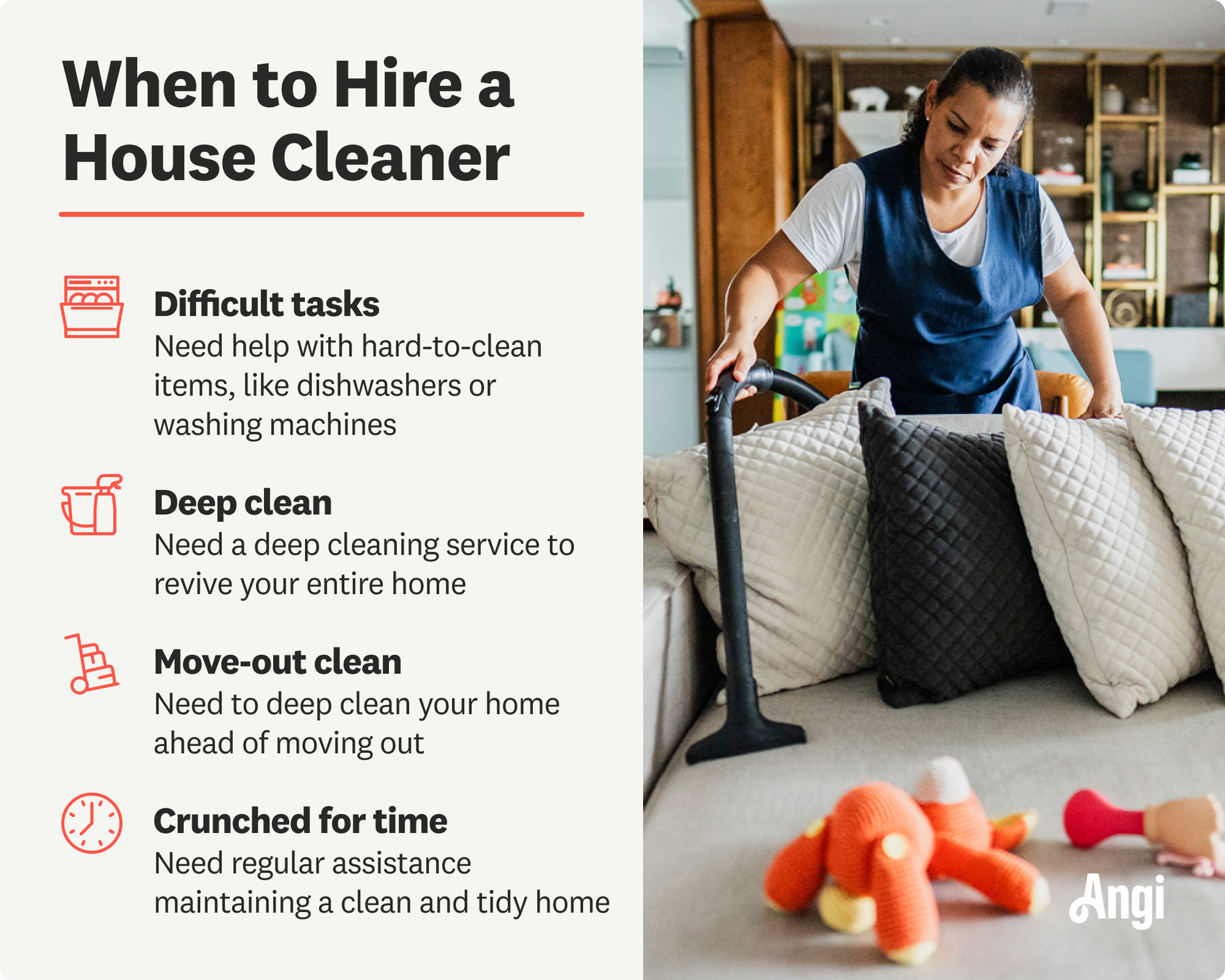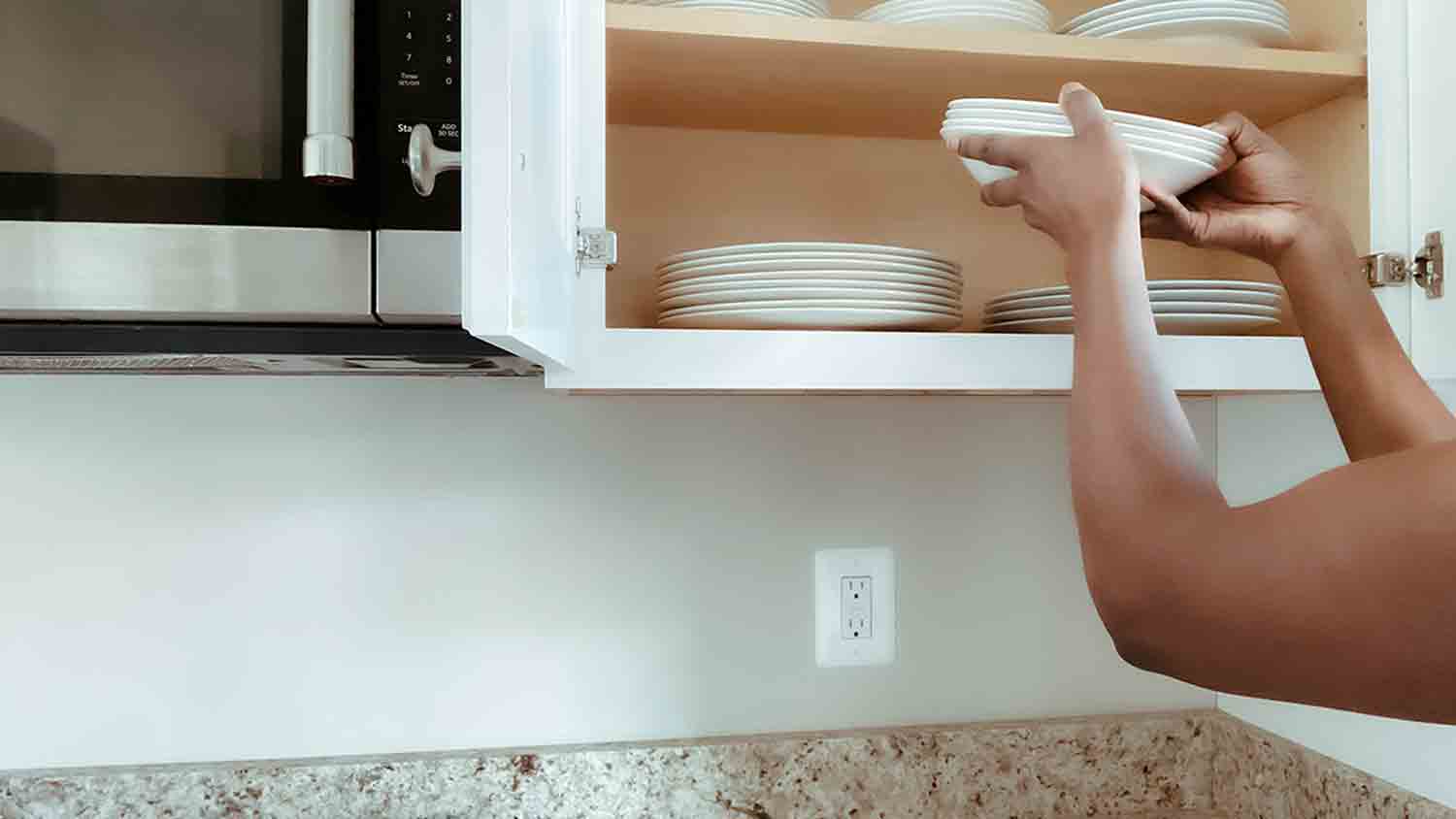
Tile and grout cleaning brings your tiled rooms back to life. In this guide, find out the details of how much it costs to hire tile and grout cleaners.
Let your home shine while you enjoy more free time


Start your house cleaner search by determining your pro cleaning schedule and whether you want to hire an independent cleaner or a house-cleaning company.
Some strategies for finding a reliable house cleaner include searching online, getting referrals, and interviewing multiple pros.
During the hiring process, request a background check and clearly define the requested cleaning tasks and frequency.
Consider instating a trial period for your professional house cleaner to build in time for feedback and special requests.
Hiring a home cleaning service is a great way to free up some of your time and keep your home pristine. To find the right house cleaner, you can search online or get referrals from friends, but you’ll also want to make sure the cleaner is reputable, aligns with your schedule, and offers the services your home needs. Here are eight tips to find a housekeeper you won’t want to live without.
When taking on this project, expect questions only a pro can answer. With our network of local pros, you'll get the job done and your questions answered—without the hassle and stress of doing it yourself.

Before you start your search for a housekeeper, establish how often you want them to come in. There are three levels of house cleaning frequency:
One-Time House Cleaner: You may hire a one-time service before moving or once a year to refresh your space. You can also hire a one-time cleaning if your home needs a deep clean before you hire a more regular housekeeper.
Regularly Scheduled Housekeeper: A regular housekeeper can come daily, weekly, biweekly, or monthly for light cleanings. This includes dusting surfaces, tidying, dishwashing, sweeping, vacuuming, mopping, trash removal, and changing linens.
Live-In Housekeeper: A live-in housekeeper works full-time for you and receives living quarters in the home or within a separate structure on the property. Some families even pay live-in housekeepers to take care of children.
Many house cleaning businesses are simply individual housekeepers operating as sole proprietors, while others are larger companies that hire multiple housekeepers as employees. When deciding whether to hire a cleaning company vs. an individual, consider these pros and cons of each.
Individuals tend to charge less than larger companies because they have less overhead. They may also offer more flexible, customized services. You’ll develop a more personal relationship with them the longer they work for you.
However, they may not be bonded and insured, or they may have minimal coverage. This means they may not be liable to cover the cost if they damage something or get hurt on the job. Mitigate your risk by getting an agreement in writing before they start working for you.
| Pros | Cons |
|---|---|
| Develop a personal relationship | No coverage when sick or on vacation |
| Fewer people enter the home | May not be licensed, bonded, or insured |
| Lower prices | Homeowners are responsible for background checks |
| More services | |
| Flexibility |
Cleaning companies hire multiple professionals as employees to offer a standard set of services. They may send a team of housekeepers to a home to increase efficiency. Because they have many employees, they can offer more reliable service without lapses due to sickness or time off. They also tend to have a formally vetted staff with licensing and insurance.
The tradeoff is in price and flexibility. Higher overhead translates to higher costs, and standard procedures mean there’s less room to negotiate add-on services or reschedule cleaning at the last minute. The service may feel less personal with so many different faces, though some homeowners prefer that.
| Pros | Cons |
|---|---|
| Conduct their own background checks | Higher costs |
| Able to provide replacement coverage | May have to deal with different employees in your home regularly |
| Typically licensed, bonded, and insured | Fewer services |
| Train employees on a set of standards | Less flexibility |
| Higher efficiency |
Looking for a housekeeper online is one of the easiest ways to find help, and most services offer bookings online.
Sites like Angi make the process simple by allowing you to browse reviews, compare quotes, and book services directly through the platform. On Angi, you can search for house cleaners in your area, inquire about their specific services, and see the cleaner’s ratings.
Another way to start looking for a great housekeeper is by asking your family, friends, neighbors, and others you trust for recommendations and referrals.
You can also read reviews using online resources like Angi. Once you search Angi’s database of top-rated house cleaners, you’ll see ratings and reviews from other homeowners, so you can verify that the house cleaner is reputable.
Ideally, it's best to chat with the individual who will clean your house. But with larger cleaning companies, you’ll likely talk with a representative who handles new clients. No matter which path you choose, prepare a list of questions to ask a house cleaner:
How many years of experience do you have cleaning homes?
Who is responsible for the cleaning supplies?
What type of cleaning supplies are used?
What guarantees do you offer, and are you insured?
What are your rates?
Do you charge hourly or by service? If hourly, what can you usually accomplish in three hours?
Do you offer weekly, bi-weekly, and monthly services?
What days and times do you have open in your schedule for our home?
What are your terms of service? (i.e. rules or fees for changing and canceling services)
Do you have references of other clients I can talk to?
Will it be one cleaner or several who come to the home? Will it be the same crew each time?
In addition to regular cleanings, do you offer one-off services like a deep spring clean or an extra session before a special event like a party?
What extra services do you offer?
Your house cleaner will have access to your personal space and be near your family, so ensure they are trustworthy and responsible. Ask if the cleaning company does background checks on their employees and if the service maintains liability insurance. Go over details about liabilities such as damaged items or an on-site injury, and get the agreement in writing, if possible.
In most cases, a residential housekeeper doesn’t need to have a specific license to become a housekeeper.

Once you've decided on a cleaning service, outline the details of your arrangement. If you’re working with a cleaning company, you may wish to define this in a contract. If it’s an individual cleaner, you might feel comfortable without an official agreement.
Some things to include in the agreement are:
Frequency of cleanings
What services will be provided
Price, either flat rate or by the hour
Which rooms, floors, and items will be cleaned
Notes for anything that needs to be handled in a certain way, such as keepsake dishes to dust
Knowing what to do before your house cleaner arrives helps maximize their time and ensure they're comfortable in your home. That’s why we recommend sticking around during the first few house cleanings to answer any questions during the service.
Most house cleaning services need a couple of weeks’ notice before their first visit, so get on their calendar sooner than later—especially if you need help cleaning and organizing during the holiday season.
Once you've interviewed a few candidates and found one you like, you don't have to commit fully right away. Instead, ask if they'll offer a paid trial period of two to four weeks. This gives the house cleaner a fair chance to get used to your specific expectations and adjust accordingly.
As the trial period ends, assess their capabilities and determine whether they're right for the job. If you're still unsatisfied after several visits with clear expectations, you're free to end the relationship and continue your search. There's no risk for you, and the house cleaner still gets paid for their time.
Hiring a house cleaner costs anywhere from $120 to $235 per visit, depending on where you live and the size and condition of your home. Homeowners typically spend between $30 to $50 per hour on a cleaner, though deeper cleans and one-time visits may cost more, such as the cost of move-out cleaning services.
It’s also worth bearing in mind that the number of people and pets in your household can factor into cleaning costs. Make sure you’re upfront about these details with the cleaner beforehand.
Once you’ve found the right house cleaner for your needs, they’ll typically conduct an initial assessment of your home to understand your space, cleaning preferences, and any specific areas that need special attention. It’s a great time to chat about things like what cleaning products you prefer and what you’d like the house cleaner to focus on.
After the first cleaning session, you can share your thoughts on what the cleaner nailed and what needs more attention in the future. Open communication and being open to the house cleaner’s suggestions help you maintain a trusting relationship and enjoy a clean home.
From average costs to expert advice, get all the answers you need to get your job done.

Tile and grout cleaning brings your tiled rooms back to life. In this guide, find out the details of how much it costs to hire tile and grout cleaners.

Garage clean-out costs vary considerably depending on the garage size, the waste type and amount, and how much work you do yourself.

Hiring a house cleaner frees up your schedule and keeps your home spotless. The cost to hire a house cleaner depends on the size of your house, your schedule, and who you hire. Use this guide to understand typical house cleaning prices better.

Follow this guide to learn when and how to steam clean walls in your home. When the wall surface is suitable, it’s an easy, chemical-free way to sanitize.

Learn how often you should vacuum your flooring to extend its longevity and reduce the number of contaminants and allergens you’re exposed to.

Hiring a house cleaner is a great fit for many. It can be the best way for busy people to have a clean home without giving up their free time. Here are some key things to help you decide whether hiring a house cleaner is worth your hard-earned money.